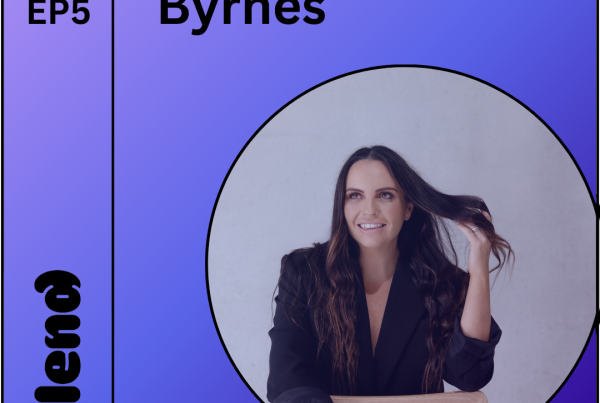
Lindsay Cameron, a co-parenting coach, shares her journey and strategies for effective co-parenting during this chat. She emphasises the importance of setting aside ego and emotions to prioritise the well-being of the children. Lindsay also advises parents to pause and respond rather than react in heated moments, and to avoid negative communication in front of the children. She recommends establishing effective communication through shared digital calendars and regular meetings to discuss co-parenting matters. Lindsay also highlights the significance of emotional intelligence and seeking professional help, such as therapy and coaching, to navigate challenges.
Lindsay Cameron:
You can only control you, you can only control how you show up. And if you would want something communicated with you, communicate it with your co-parent.
Laura Jenkins:
In The Blend is a podcast series that helps parents and step-parents navigate life in a blended family. Join me as I speak with experts and guests to get practical advice on how to create a more harmonious blended family life. Having grown up in a blended family and now a decade into raising one of my own, I bring a personal perspective to these conversations and we dive deep into the unique dynamics, logistics and challenges of raising a blended family. From new partners to juggling mixed finances, we will help guide you through it. Welcome back to In The Blend. Today, we delve into the complexities of co-parenting with a seasoned expert, Lindsay Cameron. As a dedicated co-parenting coach and a co-parent herself, Lindsay has helped numerous families navigate the challenges of co-parenting dynamics. During our chat, Lindsay shares valuable insights on fostering effective communication and navigating conflicts constructively, as well as the role of emotional intelligence in co-parenting and the positive impact that a helpful co-parenting approach can have on children’s well-being. I really did love this chat with Lindsay. She is so wise and has such a wonderful approach to co-parenting effectively. So, if you are in a co-parenting relationship yourself, this episode is for you. But before we dive in, a quick reminder that I do have an online program designed to support stepmums in navigating their unique roles, the Bonus Mum Blueprint, which is due to launch very soon. Visit our website www.intheblend.com.au to join the waitlist. All right, without further ado, let’s jump in to the conversation with Lindsay. Welcome, Lindsay. It is so lovely to be chatting to you on my Monday morning, your Sunday evening over in Canada there. Thank you for joining me.
Lindsay Cameron:
Thank you for having me, Laura.
Laura Jenkins:
Now, Lindsay, to start us off, can you share what inspired you to become a co-parenting coach and perhaps tell us a little bit about your journey in this field?
Lindsay Cameron:
I, for one, never saw myself in this role when I became a co-parent six, really exactly six years ago. My daughters were two and four and I did not see this coming. It really kind of came out of left field for our family and The first year, I would say we fumbled through it. We made a lot of mistakes. It was challenging, as a lot of people find the first year co-parenting to be. And we just always had this goal of wanting to do it differently, like wanted to make our own version of what our co-parenting journey would look like in the end. And after we started to work through some of those obstacles and see results, people took notice. And people were commenting like, oh, I like the way that you guys co-parent, or that’s so amazing that you’re going together to your daughter’s recital and sitting together, or something like that. And I just thought, OK, this is what we always wanted to do. And someone told me once, oh, you should write a book. And I thought, no way. But now I’m thinking it might be on my radar one day. And friends would ask me things, friends who were in co-parenting situations would call me and ask for advice. And it just dawned on me one day that more than just my friends could benefit from our experience and what we’ve decided to do. And I just opened it up and the response has been really, really amazing.
Laura Jenkins:
I love it. Well, I’m very interested to hear what some of those strategies and tools were that you’re implementing that were working really well. But great to hear that you’ve moved into this line of work through your own experience. So, Lindsay, what are some common challenges that you do see parents facing when navigating those co-parenting dynamics and in particular in blended families?
Lindsay Cameron:
Well, there’s many, many challenges out there and every family is different. That’s the thing too, is that every family is going to come to their co-parenting journey with their own you know, things that got them to that place in the beginning, other possible relationships, other children involved, and all the adults in the picture too. It’s really, they’re all bringing their own stuff, their own emotional maturity, baggage, whatever you want, however you want to look at it. And so I find in most cases, there’s a common theme that it’s just really letting the biggest challenges when the adults let their ego or their emotions dictate how things are going to go and dictate their reactions or how they are towards their co-parent or maybe their co-parent’s new partner or any other children involved. How they talk to the children about the co-parent, it all comes back to that just can they set their ego aside and remember that this is about the kids. It’s their childhood. This is their one shot at having those childhood years and we are in control of how we how we have them view having two homes. So a big challenge, I would say, is that the emotional piece. And that’s where I find a lot of my clients and friends who ask me for co-parenting advice. They ask me as a neutral third party person, someone who’s not emotionally wrapped up in what’s happening. And they just want to know, you know, from an outside perspective, what would be the best response to this situation. And I find that’s where I can offer so much value to families because I know what it feels like in your situation with those emotions, like I can feel it for you. I can also see the other side. Because I’ve been in six years, we’ve been through so many like, I’ve made mistakes that upset him, he’s made mistakes that has upset me. And so I can see both sides and being able to just offer, okay, if you react the way I know you want to right now, this is likely going to escalate. But if you react this way, it could really bring you closer to your goal of positively co-parenting. So I would say that’s a big one.
Laura Jenkins:
It reminds me of an episode that we recorded recently with another coach and she spoke about the need to pause in the heat of the moment and give yourself the opportunity to respond rather than react. So I love that people are coming to you. taking that pause, workshopping what is the best way I deal with this, and then coming back to respond, ideally in a more graceful and helpful manner.
Lindsay Cameron:
Yes, and it sounds so basic, but I tell people all the time, just turn your phone off. When you get that text, or maybe they hung up on you, you were in an argument over the phone with your co-parent, or maybe it’s their new partner, turn off your phone. Don’t write what you want to say in this moment and press send because you won’t be happy with yourself later that you did that. So I just say turn off your phone, go take a shower, go for a walk, do something and revisit this later. And in my own experience, when I’ve, you know, responded with the heat of the moment text, it’s just like, you can’t stop. And it doesn’t help. But then if I don’t, oftentimes the next day, I actually get a text apology from him, if it was something that, you know, like both people just need time to reflect.
Laura Jenkins:
And sometimes it just fixes it. So true. I’ve had another guest on the show who spoke about text messaging with an ex-partner and said, just be mindful that whatever you write in a text message could be read in a courtroom one day. And it depends on the severity of the relationship breakdown between the two of you. But I thought that was really sage advice just to ask yourself, would I want this message read out in a courtroom? Exactly. How then do you approach helping parents establish effective communication and collaboration, I guess, with their co-parents, ultimately for the benefit of their children?
Lindsay Cameron:
So communication is huge in any relationship and it’s no different in co-parenting. And this is something that I find it really impacts how you can communicate when the two parties involved, like what is the main goal? Is the goal positive co-parenting? And I find a lot of my friends who come to me or clients who know our story, they come to me for that reason, because we have gotten to a very positive place with our co parenting, and we spend a fair amount of time together with the kids. If that’s the goal, then It makes communication easier because you know that that’s what you both want ultimately, even if emotions are high and there’s an argument or something, but you’ll come back to that space and just kind of recenter because you’re both working on that goal. It’s when one side seems to be making things intentionally difficult that it can make communication a bit harder. but i tell clients you know it’s just you can only control you and we hear this all the time in many aspects of life but you can only control you you can only control how you show up and if you would want something communicated with you communicate it with your co-parent so if there’s something something comes up about the child when they’re with you and you would want to know if that happened when they were at their other home then you know maybe send a quick text give a phone call depending on the the level of the relationship positivity at the time some like some families they do have court agreements that they can only email each other and it’s like okay well if you would want to receive an email knowing this update about your child when they’re with their other parent then send the email.
Laura Jenkins:
Yeah, I love that one.
Lindsay Cameron:
That’s a great, great tip. One that, and this is something that we did more frequently in the beginning. I’d say the first two to three years of our co-parenting was to meet up together to go for coffee without the kids. And it sounds so strange. Like people are like, why don’t you go for coffee? Like, you’re not a couple. I’m like, no, but we parent together. And it’s like, some people do say like parent co-parenting is like, it’s like a business. you know, process because you’re raising these kids together. So, you can have a business type of relationship together. Well, business colleagues would have to have a meeting to discuss things. So, we would do that. We would go for coffee. We would lay out the schedule if we had to change any like we just have, we have a funny kind of schedule. Like we don’t get the luxury. He works shift work, so we don’t get to do like a set schedule. So we’re always kind of shifting it around. But if we need to tweak the schedule or go over expenses or kids activities or things like that, we just went and got a coffee and we sorted it all out. We had a notebook and like it was very… And I suggest that to people. Business-like. Yeah.
Laura Jenkins:
Yeah, what a good analogy. That’s so true. It’s just how would you need to respond if you were managing a business in exactly the same way, wouldn’t you? You’d be sitting around the boardroom and resolving issues as they arise.
Lindsay Cameron:
And if you think like, what if you just did that every few months? and just brought any concerns. And as you have your your children move through different phases, our girls were very young. And so now like they’re moving into their since several years now, like going to sleepovers and like having new friends. And all through the pandemic, we didn’t get to meet all of the other parents of their friends. School drop offs look different. So things like that. It was just communicating. Have you met this parent? Are you comfortable with this? They want to do this activity. So just making sure you’re still on the same page.
Laura Jenkins:
Yeah, I love it. What other tools and strategies outside of communication specifically have you suggested to clients or have you found in your own experience that have been helpful in managing that co-parenting dynamic?
Lindsay Cameron:
This one, I would still say it kind of falls under communication, but having a shared digital calendar is the best tool that we have found. And we just, we use Google calendar. We both, he puts all of his work shifts in there. So then I know, but then I’ll also put in if I have like a massage appointment or something, like it all goes in the same calendar. And then he knows if I can’t reach Lindsay right now, he can check the calendar. Oh, she had this booked or like, he’ll have his workout classes in there. Like some people, again, they think that’s weird that I know like when he goes to the gym, but If there was an emergency and I can’t reach him, then it is what it is. He doesn’t put his dates in there or anything, but still, you know what I mean? Just important things and then all the kids’ activities.
Laura Jenkins:
Yeah, I think that’s very sensible.
Lindsay Cameron:
It cuts down on how much we have to text back and forth too. Consult the calendar. Yeah, consult the calendar.
Laura Jenkins:
Yes. And Lindsay, do you have a new relationship now and a separate calendar that you keep in addition to the shared calendar with your ex-partner?
Lindsay Cameron:
I laugh because no, I don’t. I did at one point. We both, in the six years, we both have had one other serious relationship where they’ve met the girls, our daughters, but currently no, both single. But that is what we had done at the time was I had a separate calendar. So yeah.
Laura Jenkins:
I love it. We’re all about the calendars as well and I’m a big fan of color coding, all the different aspects of your life. Us too. So, Lindsay, let’s talk a little bit about conflict because conflict and disagreements show up all the time in co-parenting. How do you guide parents in resolving conflicts constructively and maintaining a positive co-parenting relationship along the way?
Lindsay Cameron:
It’s so true, like you said. And even, you know, marriages where people are living in the same home, there’s always going to be conflict. So thinking that there will never be, or when people say to us, like, you guys get along so well, like you must have no conflict. We definitely do. And we’ve just learned how to get through it with minimal damage, you know, to the overall relationship and to the kids. So I think that just having some strategies for how to cope through that is key. And that’s part of coaching that I do with every client is having a plan for when there’s conflict, how are we going to move through that? Because you’re not always going to have a coach to contact or call right away. So you have to have that plan for yourself. And I think the most important thing to remember is, what is the main goal? So whatever it is you’re arguing about, it could be I know vaccinations was a big one when that was, you know, in the pandemic, it’s like one family member didn’t want to one did, and then they couldn’t see eye to eye. And really, whoever had the kids could take them to get the vaccine, like it was a big thing. So that just having the main goal of, okay, we want children who are thriving, we want children who are going to look back on their childhood, and have positive things to say about their parents raising them in two homes. This is my main goal. And then what a lot of people say, oh yeah, I would love that for them to talk about being proud of how mature their parents handled raising kids in two homes. So OK, say that’s your main goal, and then a conflict arises. First of all, like we said, turn off the phone, go for a walk, journal it out, do a workout, meditate, whatever your choice is for being able to get your thoughts straight, center, come back and not have that fiery emotion that you’re operating from. And then just asking to have a calm conversation, usually in person. Sometimes the phone can be okay, really not on text. Text and email, so much gets misinterpreted. So I really discourage clients from using text or email. if possible, when they’re needing to talk about something. So we’ll even if it’s a pickup or drop off with the kids, I’ll like I’ll drop the kids off, tell them to go inside, and then he and I’ll have a little chat. And then he’ll go in. So they don’t hear like you really, really, really, I can’t stress this enough, want to keep conflict away from the kids eyes and ears. And if you’re rehashing it to your best friend over coffee while the kids are in the playground, make sure they can’t hear you. They don’t need that, right? That doesn’t need to be part of what they observe about the relationship.
Laura Jenkins:
I 100% agree on that one. And I think they’re all really wise tips when it comes to conflict. What about emotional intelligence? Because I think it’s super important, especially in a co-parenting dynamic. And it comes back to the idea you mentioned earlier of just keeping those emotions under control. But what role do you think emotional intelligence plays in the co-parenting piece? And how have you supported your clients in developing this skill to navigate certain challenges?
Lindsay Cameron:
This is such a huge skill. And it’s one of those situations, co-parenting, it’s like it brings all your stuff to the surface, like all of your own childhood stuff and everything. So you really do need to be an emotionally mature person. to do this well and I feel like it’s like personal development times a thousand when you’re in a relationship like this and especially if you’re involving other partners and other children and all of it because it’s putting you it’s putting you face to face with so many things that you probably wouldn’t have had to deal with otherwise. So really knowing yourself and being able to not react, like we said, from that space and just taking the high road, remembering why this is so important and having other outlets. So like I said, not letting your kids hear you talk negatively about your co-parent and the relationship or maybe their new partner or whatever. I still tell everyone, like, you can have me as a coach, you also need a therapist. Like, I truly believe that we all benefit from having our own individual therapist. My daughters have a child psychologist they see. I recommend, you know, family counseling. If you and your co-parent and new partners can go, like, that is incredible to be able to have those types of um, support as part of your toolbox. Like have a coach, have a therapist. Yes, have those friends that will listen, but pick the ones that aren’t just going to take your side. Like the ones that will show you when you’re, you know, could you say this instead? You know, did you have to, like, maybe it wasn’t the best thing to say when you responded like that. Like those are the kinds of people that can help you.
Laura Jenkins:
I couldn’t agree more with that, Lindsay. I’m a big fan of seeking the professional help through therapy and also coaches, as you say. I was just thinking about a previous guest who spoke about turning to chat GPT when all else fails. To ask ChatGPT, how do you think I should respond to you? That’s so good. It did make me laugh. So if anyone listening is feeling a bit short on outlets at the moment, there’s always ChatGPT.
Lindsay Cameron:
I’m going to try a couple of responses and see.
Laura Jenkins:
Oh dear. Lindsay, are there any success stories that come to mind from your coaching practice that perhaps illustrate the positive impact of effective co-parenting on children’s well-being?
Lindsay Cameron:
Absolutely. And I tell clients all the time, like, there’s truly no difference between a small win in co-parenting and a big one. Like, it’s all wins for the kid. And I think seeing the way that children can change throughout their journey being raised in two homes from maybe more of like anxious and moving into a space where they’re they’re really comfortable and they can be a kid because a lot of families like I keep going back to ours the girls were so young and seeing them kind of evolve into a space where they’re not only no longer talking about I wish we all lived together but they’re so comfortable with like daddy can come over to mommy’s house for the birthday dinner and it’s no big deal and seeing that um progress I guess in the in the child is so just rewarding. And then hearing those stories from clients, clients who they could only communicate through email prior. And that wasn’t court ordered. It was just they had asked their co parent like only email me don’t text, don’t call. It was a really unhealthy Relationship in the beginning and it is the first year especially can be so so so hard that you just think is this what I’m going to be going through till this child is 18 and beyond. But hearing from this one client that that’s where they started. And then after our co-parenting time, she would still update me and that they all went to their daughter’s sports game and sat together. And just like, if you can do that and have it not be… Because not everyone’s ready for that in the beginning, right? Like that’s too tense if there’s an unhealthy relationship there. But being able to get to that space and seeing how happy that it made her daughter, that is just such a success, I find.
Laura Jenkins:
Oh, I agree. I love that. That’s great. What a win. And it comes with that maturity and that acceptance of, hey, this is what it is. We’re not together, but we’re still a team. We’re a parenting team here, and we’re going to show up as a team.
Lindsay Cameron:
And it takes steps, too. It’s not like you’re just going to get to that tomorrow. Some relationships It takes several times, you know, and talking about it and saying, you know what, I think this would be a good idea. What if we tried this? And, you know, it’s, you have to take small improvements as still being big wins.
Laura Jenkins:
Lindsay, you’ve shared so many good tips today. Are there any other final words of advice that you would share for perhaps any co-parents out there who might be struggling and feeling like it is a long road and it’s never going to end? What else would you say?
Lindsay Cameron:
I would say Don’t undervalue the simple act of thanking your co-parent for small things and apologizing when you make mistakes because Oh my goodness, I’ve made so many mistakes. And there’s one that I always tell people. I’m not going to say it on here because it’s not kid-friendly to hear this story. But I made a massive mistake in front of the kids in that first year. And I regretted it. And they heard it. And it was awful. And just apologizing to them when I made a mistake, apologizing to my co-parent, We all like, I still make mistakes and I’ll say, you know, I’m so sorry. I really didn’t think about how that would feel on your side of things. And I really should have done it this way. Next time I’ll, I’ll do better. And like I said, we’ll have arguments and I’m so like, so angry and I just won’t, I won’t respond. And then the next day, 95% of the time I get a, I’m sorry, text, like work was really hard. I didn’t sleep and I’m so sorry. So just giving that space, being humble enough to apologize when you make mistakes, it gives your co-parent that opportunity to do the same. And just like never underestimate the value of sending a text, even if it’s, thank you for feeding them supper before you drop them off. Or, you know, thank you for getting the back-to-school sneakers or whatever. There’s something that you can thank them for. You might have to dig really deep if you have a lot of hard feelings, but there’s something you can thank them for. It shifts the dynamic in the relationship and you’ll get there to that positive space if you’re being intentional to show up and do those things, thanking them and apologizing.
Laura Jenkins:
Where can people go to connect with you if they’d like to reach out for some coaching? I know you do online coaching for those who aren’t in Canada. So yeah, where can they go to connect with you and learn more about your services?
Lindsay Cameron:
They can find me on Instagram. I’m at lindsay_cameron_. That’s where I hang out and love to share my co-parenting tips and journey and client wins. So come on over and say hi.
Laura Jenkins:
Wonderful. Thank you very much. We will link to that in the show notes. Well, Lindsay, it’s been an absolute pleasure. Thank you again for your time. Thank you so much for having me, Laura. Thanks for listening to the In The Blend podcast. The show notes for this episode are available at intheblend.com.au. And if you like what you heard, be sure to subscribe and please rate and review in your podcasting app. You can also follow me on Facebook, Instagram and LinkedIn.





